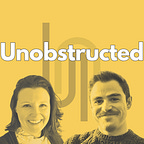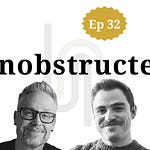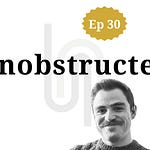You’re not responsible for what other people think of you.
And yet, we often say we’re sorry for no reason—for just existing. There are two very different applications for saying you’re sorry. There’s the acknowledgement or validation of somebody else’s experience. “Hey, I’m sorry that happened to you.” And then there’s the ownership or accountability of something you contributed to an experience. “Hey, I’m sorry I did that. That was wrong of me. And I recognize that it caused this for you.”
If you’re never taught that difference, things can get very confusing and you can slip into over-apologizing territory.
When you’re made to feel your existence is an imposition to other people, you start to over-apologize… for just existing.
“…the word ‘whatever’—and how you say it—can dissolve relationships because it can be seen as so dismissive” Rachael told me during a recent conversation.
And I found that fascinating. My wheels started spinning as I thought about it more. I wondered what was behind that—why did people find it to be dismissive?
That’s how Rachael and I stumbled further into a discussion about other phrases that could be problematic, based on their intent and the way that they’re received.
“I tend to say, ‘sure’ as an affirmation” I admitted before adding “you know, like ‘hey, do you want go out to eat? Sure.’” I’ve been told that that sounds standoffish or non-committal, even though I genuinely mean it with positive intent. I use it to offer an air of flexibility.
So what about phrases like this cause people to react defensively?
The Unobstructed Podcast: Episode 27
In this episode of The Unobstructed Podcast, Rachael and I talk about how words like “whatever” and “sorry” impact relationships. The episode discusses the concept of taking up space, both physically and metaphorically, and the importance of setting personal boundaries.
It comes down to the amount of responsibility we feel for managing others’ emotions ahead of our own.
Shrinking ourselves and the space we take up by withholding or filtering isn’t the answer. And, at the same time, being mindful of our language and the context in which we use it is important.
I find it ironic that small words and phrases encourage us to shrink ourselves.
That’s the kind of thing that leads to a habit of over-apologizing. Which can be a learned, trauma response in the same family as fight, flight, freeze, and fawn. And this can be trauma like a “big-T” traumatic event, or like “little-t”, nervous system dysregulation.
When over-apologizing shows up as a fawn response, it’s meant to disarm and to pacify others after picking up on their emotional dsyregulation. Fawning is an attempt at shrinking yourself to regulate their emotions for them.
For example, if you grew up in a chaotic environment where your caregivers or the people around you were emotionally unpredictable, you could have learned that disrupting someone’s emotional state is a threat to your own safety.
The words that hurt us often turn out to be misunderstood rather than malicious.
Our inner alarm that makes us wonder if something’s up? That’s usually true—something’s probably up. But what you think it’s about is usually wrong. Gabor Maté talks a lot about what causes this and Brené Brown talks a lot about what it looks like and how to change it.
Something I’ve heard used to describe this phenomenon that really stuck with me is thinking about the difference between trying to control your environment and trying to control yourself within an environment. The people who tend to over-apologize, or over-explain themselves, have learned that they need to control an environment—and the other people in it—to create a sense of safety.
Most people don’t realize that.
Gender biases and social norms teach us who’s allowed to take up space.
After some back and forth about what causes misinterpretation of those small, inflammatory phrases like “whatever”, Rachael shared a brilliant insight. She pointed out how female-identifying folks, in particular, are often taught to take up less space. And that it’s a behavior rooted in social conditioning. Wow, yep. She was completely right.
At the same time, I’ve just always struggled with gendered descriptions of behavior.
I was raised by my mom, in a single-parent household, where the rest of our extended family was very matriarchal. My grandmother immigrated to the U.S. from post World War II Germany and was a single mother, herself. Her mom, moved to America thereafter to help raise my mom, my aunt, and my uncle. And I think that’s undoubtedly had a multi-generational impact on our whole family unit.
The core of over apologizing is a fear of taking up space and a lack of personal boundaries.
Growing up in chaos teaches us to shrink ourselves to accommodate others’ emotional volatility.
I’ve worn the responsibility of managing others’ emotions throughout my own life. And I’ve just never felt like I related to the stereotypical male-behavior of believing I could take up space by default.
I’ve never identified with it—it doesn’t make sense to me. I don’t feel like I can walk into a room and just… enjoy that patriarchal privilege. And I’m not saying I don’t have it. I’m sure when people look at me, that’s what they see. But I’ve just never related to it. I have always felt like I’m more aligned with what’s traditionally considered to be a female-identifying stereotype: internalizing an expectation of emotional responsibility for someone else’s comfort ahead of your own.
I saw how my dad expected to take up space, and expected other people to let him. To accommodate him, and move themselves around so that he could continue to exist in a state of emotional dysregulation. And I resonate more with the way my mom, for example, would respond in certain situations to the societal expectation of not taking up space. Same with my sisters, my aunts, and my grandmothers.
It’s very confusing for people who don’t know what they can and can’t allow themselves to do. Undoing that requires a process of learning to set your own boundaries and building your own coping skills—whatever that looks like to you.
Generational differences play a role in how we interpret language.
During our conversation, Rachael also very astutely noted how words that were common for her generation growing up, like “whatever,” may be perceived differently by younger generations today. We explore more of this in the episode above. You can also listen on Spotify, Apple Podcasts, and Amazon Music.
onward.
P.S. If you’re new to my work, I think you’d also enjoy my blog. That’s where you’ll find everything I publish, including my daily email series.












